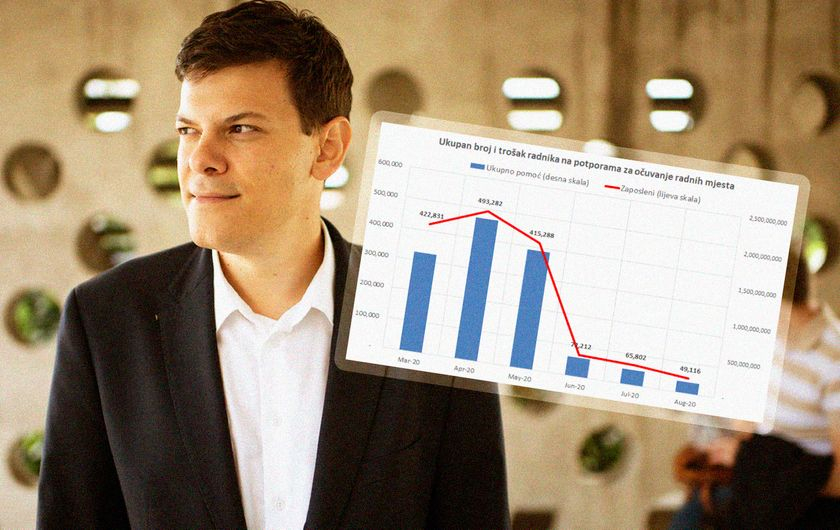
As Marko Repecki/Telegram writes on the 14th of December, 2020, if almost 7,000 vulnerable companies fail (according to the data from August, they’re now even more endangered than they were before with this new lockdown), the Croatian state budget will lack a massive 3 billion kuna, which is equivalent to funds for as many as 130,000 pensions, according to the Voice of Entrepreneurs Association (Glas Poduzetnika). Economist and head of the Economic Council of the Voice of Entrepreneurs, Vuk Vukovic, analysed the effect of the collapse of vulnerable companies on the state budget.
The aforementioned association has been warning that micro, small and medium-sized enterprises will unfortunately be the ones to bear the brunt of the ongoing coronavirus crisis and that many of them will have to close their doors due to the lack of concrete assistance.
About 500,000 workers were affected by the measures
Vuk Vukovic’s analysis is based on data on aid for job preservation from the Croatian Employment Service (CES), which is presented by month, and on data on the financial statements of all Croatian companies from back in pre-pandemic 2019.
Table 1 and Graph 1 indicate several interesting trends. First, during the lockdown (from March to the end of May), between 415 and 500 thousand workers were affected by the then introduced measures. This regards employees who, at least at that time, depended on state aid of 4,000 kuna because they weren’t able to work (their companies were closed or they were in isolation).
In 2019, they generated 419 billion kuna in revenue
A total of 55 thousand companies were, at one time, dependent on this type of assistance. It’s worth pointing out that these companies generated a total of 419 billion kuna in revenue in 2019, which is more than the Croatian GDP from that year (which amounted to about 400 billion kuna) and represents 52 percent of the total revenue earned by all Croatian companies in 2019. Half of the Croatian economy was directly affected by the crisis caused by the COVID-19 pandemic.
“This doesn’t mean that 419 billion kuna in revenue was endangered because not all revenues fell by more than 50 percent, some actually fell by much less, but in those months, many companies asked for support,” explained Vuk Vukovic.
After the lockdown, there was a drop in the number of people provided with the aforementioned grants
Interestingly, after the lockdown, there was a sharp drop in the number of people using those government subsidies, from 415 thousand down to a significantly lower 72 thousand in June, and from 54 thousand companies to 6800 who were still seeking such support for their 49 thousand workers during the month of August. These companies, which were obviously still sailing through troubled waters three months after the lockdown and as such needed to seek 4,000 kuna in aid for their workers, account for a total of almost 37 billion kuna in revenue (9 percent of GDP).
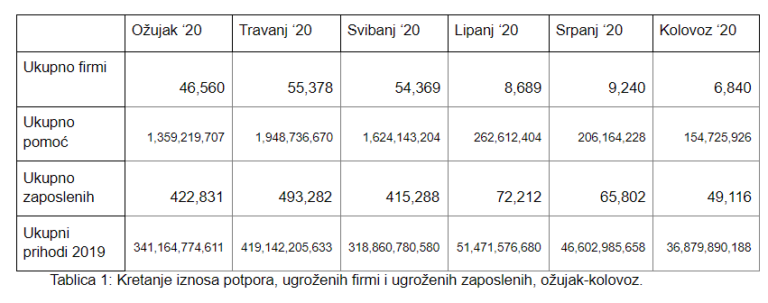
In other words, the collapse of these companies, which haven’t yet recovered from the shock of this continuing crisis, directly threatens 49 thousand jobs and 9 perent of GDP (this data refers to the period before the new, partial lockdown came into force).
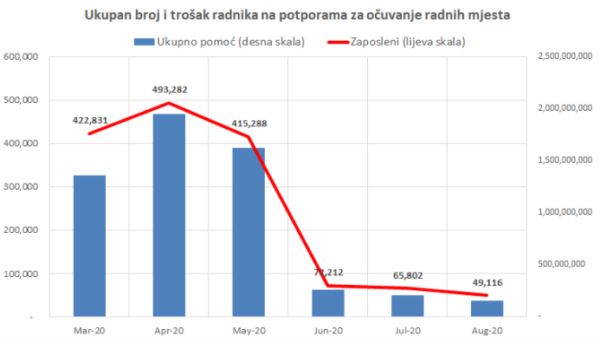
The next category is the data on paid taxes and contributions of micro, small and medium enterprises registered in Croatia. Table and Graph 2 show the distribution of income tax payments and taxes and contributions from salaries and employee salaries for all companies in Croatia for the year 2019.
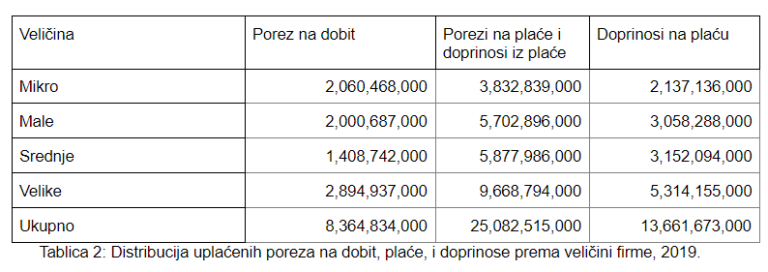
They paid 29.2 billion kuna in taxes and contributions last year
Back in 2019, micro, small and medium-sized (SME) companies in Croatia paid a total of 5.5 billion kuna through profit tax and 23.7 billion kuna through taxes on salaries and contributions. This total amount, excluding VAT, of as much as 29.2 billion kuna, was enough to cover the total costs of the healthcare system in 2019, which stood at around 12.8 billion kuna, the police, court and prison costs (8.8 billion kuna), military expenditures (4.7 billion kuna) and even expenditures on sports, religion and culture (an additional 2.6 billion kuna).
Or, a different calculation of 29.2 billion kuna collected only from micro, small and medium enterprises would show that it was enough to finance the total cost of pensions of 27.4 billion kuna, or to almost cover the total cost of expenditures for public sector employees, which in 2019 amounted to 29.6 billion kuna.
A ”hole” of 3 billion kuna has been formed through a drop in the payment of taxes and contributions alone
Micro, small and medium-sized Croatian enterprises pay the state budget an amount sufficient to finance all pensions or all salaries in the public sector or the entire healthcare system, the police, courts and prisons, the army, sports, religion and culture. If we focus solely on those Croatian companies that received aid, whose revenues at the height of the pandemic and lockdown accounted for 52.5 percent of that of the Croatian economy, such companies paid about 24 billion kuna from income tax and taxes and contributions to salaries (excluding VAT) for 2019 alone.
After the lockdown came to an end, far fewer companies were left at risk, but their potential collapse will create a hole of as much as 3 billion kuna just through the drop in taxes and contributions to the state budget. This effect of the collapse of about 7,000 of the most vulnerable companies alone means less money for the healthcare system, pensions or for public sector wages. In particular, the collapse of the 7,000 most vulnerable companies would jeopardise as many as 136,000 pensions or about 25,000 salaries in the public sector.
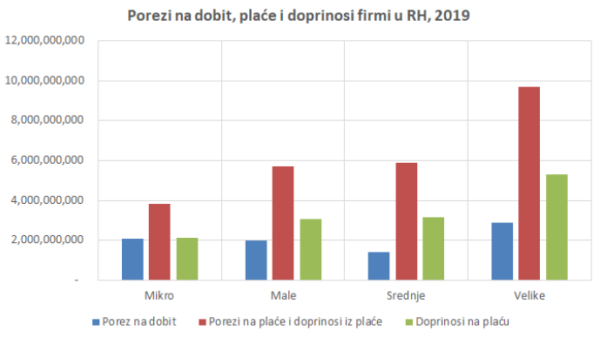
Vuk Vukovic: The government needs to find a way to save these companies
”It should be borne in mind that this is an impact assessment based solely on the latest data available from the end of August. At the end of the year, after the new lockdown, even more Croatian companies are likely to find themselves in troubled waters, which means that many more jobs are potentially yet to be put at risk, and as such, tax revenues and budget contributions will also be in the same boat.
I’d like to note that these calculations don’t take into account the lack of VAT revenue from companies that will potentially fail and whose staff would find themselves out of work. Thus, all of the above estimates very likely underestimate the strength of the final effects of all this. I think that the situation is very serious and that the government should find ways to prevent the collapse of so many companies as soon as possible,” concluded Vuk Vukovic, the founder of the Economic Council of the Glas Poduzetnika Association.
For the latest travel info, bookmark our main travel info article, which is updated daily.
Read the Croatian Travel Update in your language – now available in 24 languages
Join the Total Croatia Travel INFO Viber community.









